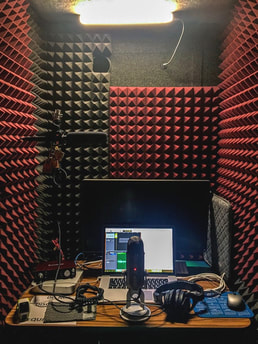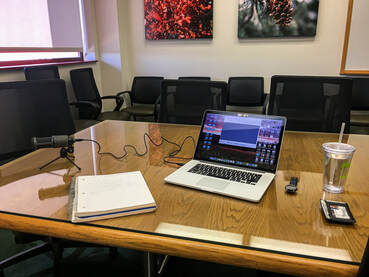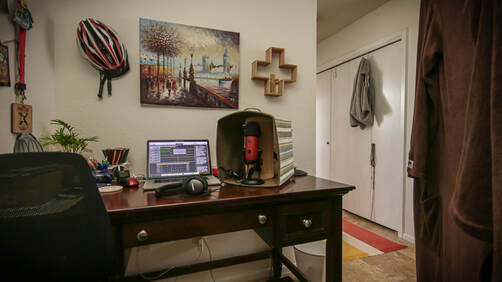|
Since November last year I'm hosting the ECCF podcast, a science podcast that covers climate change research, science communication, and gives career advice for grad students and young professionals. Most people I talk to have not had a straightforward career path that led them to the jobs of their dreams. With this podcast, I'm exploring how they did it and what challenges they faced. I recently uploaded episode number six, finished in my make-shift sound booth at home, thanks to COVID-19, so I thought why not go through each episode, summarize them, and share some lessons learned from creating this podcast.  Narrating in a sound booth at the Texas A&M University library Narrating in a sound booth at the Texas A&M University library
Episode 1 - Dr. Kristen Weiss (science communicator)
November 21, 2019 (25:57 min) Kristen is the communications coordinator for the US Long-term Ecological Research (LTER) Network at US Santa Barbara. She is a video producer, photographer, and blogger with an impressive science background. She earned a Ph.D. in policy and natural resource management in Australia and did a science communication postdoc in California. She visited Texas A&M to speak in our departmental seminar series "From Knowledge to Action" about her work at the LTER Network. Kristen was actually my second interviewee, but because the launch of our podcast lined up well with her participating at an all-female sailing expedition to study ocean pollution, I decided to put her first to advertise the expedition in the outro and the episode description. While her interview was an improvement over the first one (with Sarah McAnulty below), the episode still had plenty of obstacles. The biggest one was recording the intro, intermission, and outro, to bookend and loosen up the episode. My office was neither quiet or echo-free enough for that, so I booked a one-person, very dark sound booth at the university library for two hours one day after work, thinking that would be plenty to record a few minutes of me reading some text off a screen. Needless to say it wasn't, because the slightest pause, slip of the tongue, mispronunciation of a word, or other proverbial hiccup put me back to the starting line. I learned to cut and paste together good segments, but even then, small changes in volume, pitch, or speed would turn the result into a patchwork of sounds rather than fluent lines of spoken word. An even when everything was recorded in good quality, I sometimes found that what I said didn't quite sound as good as I thought when I wrote it, or I wanted to add one piece of information, and scrap the recording to do it all over again.  My recording setup for Sarah McAnulty. Far from perfect, but it did the trick. My recording setup for Sarah McAnulty. Far from perfect, but it did the trick.
Episode 2 - Dr. Sarah McAnulty (Skype A Scientist)
December 23, 2019 (24:31 min) I was really excited to interview Sarah! She is the founder and Executive Director of Skype A Scientist, a global organization that connects scientists with school teachers for classroom chats about their research, what it means to be a scientist, how they became one, and much more. I've been a participant of Skype A Scientist since early 2018 and talked to over a dozen school classes since then, about my work, myself, the impacts of climate change, and what we can do to adapt. Like Kristen, Sarah was on campus to give a departmental seminar about her work as a squid biologist at the University of Connecticut, and of course to talk about Skype A Scientist, which was also the focus of this podcast episode. Unlike Sarah, who had been on NPR's "Brains On!" and many other podcasts, this was my first podcast interview ever. So, needless to say I was nervous. I had interviewed people for newspaper articles before, but the technology part here was all new, and the thought of messing up an interview with Sarah McAnulty was a bit terrifying, despite much testing and practicing. First, the microphone I borrowed (an AudioTechnica AT2020+USB, for audiophiles) was uni-directional (a so-called cardioid recording pattern), perfect for one person speaking but not so much for a conversation between two people. I solved it by pointing it upwards, which resulted in some echo from the ceiling, though. Second, Sarah had quite a strong voice, louder than mine, and the mic was positioned closer to her, so during editing I had to painstakingly lower the volume when she spoke and raise it again when I spoke. Apple Garageband is pretty intuitive to use, but this took forever. And third, the fridge at the end of the conference room we recorded in! Barely noticeable during the interview, it left a very annoying buzz on the recording. Garageband doesn't have a noise filter, but thankfully Audacity does, which took care of this. When all was done, we posted the episode two days before Christmas.
Episode 3 - Dr. Jeff Martin (bison researcher)
February 13, 2020 (13:29 min) At the time of our interview, Jeff was a doctoral student in a department one floor down from me (he just defended, woohoo!). His research on the effects of climate change on bison body size across the Great Plains is amazing, and it overlapped quite a bit with my work on cattle ranching, so naturally I wanted to talk to him. Thanks to a brand-new Blue Yeti (a Christmas gift from my wife), audio issues were a thing of the past. However, pressed for time, I didn't have a good set of questions when we got together. So as scientists do, we got into the weeds of our work and got sidetracked way past the interests of any listener. Thankfully, Jeff, despite being in the middle of thesis writing, agreed to record the entire interview again, this time with a list of questions, less jargon (we tried), and more commitment to staying on topic. The interview went well, but I made the unfortunate decision to try and make this a shorter episode focused primarily on his research results. That meant I cut out much of him talking about the relationships he had to form with bison ranchers and organizations to get access to grazing land, animals, and fossil records. A big mistake in retrospect, because it was essential to the success of his work and is often undervalued in our pursuit of fast results. You can read more about Jeff's work on his website, including many articles about his work he wrote for a general audience.  My make-shift sound booth at home. My make-shift sound booth at home.
Episode 4 and 5 - Dr. Jessica Whitehead (North Carolina's Chief Resilience Officer)
March 27 and April 6, 2020 (29:19 min and 38:38 min) These two episodes were less work for me, because my colleague, Dr. Adrienne Wootten, a climate scientist in Oklahoma, took care of the interview part. Jessica's career path is anything but straight and her day job was nothing short of fascinating, so Adrienne's chat with Jessica was long. So long in fact, that we decided to split the interview into two parts (and still produced the two longest episodes at the time), covering her career path in part one and her day job in part two. We ended part one on a small cliffhanger, and posted them about ten days apart. Jessica's interview presented two new challenges. One, we needed Jessica's boss' approval for the interview (because she is a federal employee), and two, it was the first one we recorded remotely, not in person (not because of COVID-19, but because of the distance between Oklahoma and North Carolina). Adrienne used Zoom, which records audio and video on the host's computer (set the location under Preferences > Recording). Even better, audio streams from each participant can be saved in separate files (also under Preferences > Recording). This makes fixing issues with quality, volume, or background noise much easier. In noisy environments, it helps to wear headphones with integrated microphone, like Apple's EarPods, instead of using the computer's microphone, because the headphone mic picks up a person's voice better and reduces the ambient noise. Bluetooth headphones are not a good idea, because they cause delays and chop off the beginning of a person's audio, Adrienne and I found out the hard way. We assume the bluetooth connection enters a kind of power-save mode if a person doesn't talk for a while (which was the case here), and it needs a second to "wake up" when the person does say something. We did not test with bluetooth headphones and only found out after the interview that Adrienne's audio turned out choppy and distorted. So, corded headphones with integrated mic is the way to go. Thanks to COVID-19, I had to record intro, breaks, and outro from home, which made logistics easier, but recording harder. Even though our apartment is fairly quiet, the occasional train, plane, or car would still torpedo my hard work, in addition to a noticeable echo off the walls. The solution was a make-shift sound booth constructed from a collapsable box and a blanket hung from two lamp posts to reduce the echo. It was inspired by Michael Barbaro's setup for "The Daily" podcast, which, like UCS's "Got Science", Pew Research's "After the Fact" and every other podcast I listen to, had to content with the same problem: working from home. To avoid our neighborhood's noisy A/C units, which slowly woke up from hibernation (we had a very warm March), I recorded mostly in the mornings. I can't be sure, but I'm just going to tell myself that all this effort made my voice extra crisp and the episode even more fun to listen to.
Episode 6 - Dr. Hailey Wilmer (social rangeland scientist)
May 6, 2020 (38:54 min) Hailey is a social scientist who studies decision making in rangeland management. With a bachelor's degree from Cornell and a Ph.D. from Colorado State University, she was a postdoctoral fellow with the USDA Northern Plains Climate Hub in Fort Collins, Colorado. She was part of the Collaborative Adaptive Rangeland Management (CARM) project, which is what I wanted to talk to her about. CARM is a large-scale, long-term field study in Colorado that involves ranchers and scientists to study the effects of different rangeland management styles on the health of grasslands and the economic benefits for ranching. It epitomizes the idea of science co-production, the collaboration of scientists and stakeholders to better inform decision making in the real world (Djenontin and Meadow 2018 provide a good "how to" guide). I wanted to talk to Hailey, because I love her kind of work. It brings together academic researchers, government agencies, NGOs, and ranchers, and combines the strengths of systematic inquiry (you know, scientific research) in a range of disciplines from social science and meteorology to agronomy and ecology, with the expertise of decision makers on the ground. The episode with Hailey did not really make any trouble, so maybe by now I have aced the Podcast 101. Like Jessica Whitehead, Hailey (a federal employee) had to request her boss' approval (a formality in both cases), and we recorded the episode during a conference in Denver that we both attended back in February. Hailey and I met at the end of a conference day, I brought my Blue Yeti, and we found a quiet room in a corner of the conference hotel. The audio was excellent, and the only mishap you will hear at the beginning, was when we knocked against the table a few times while the mic was recording. |
 RSS Feed
RSS Feed
